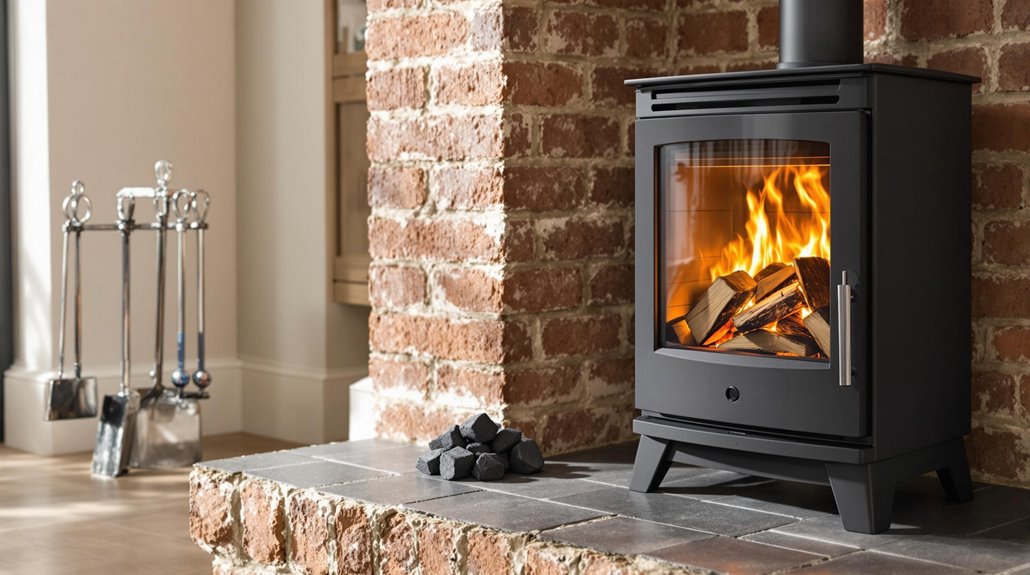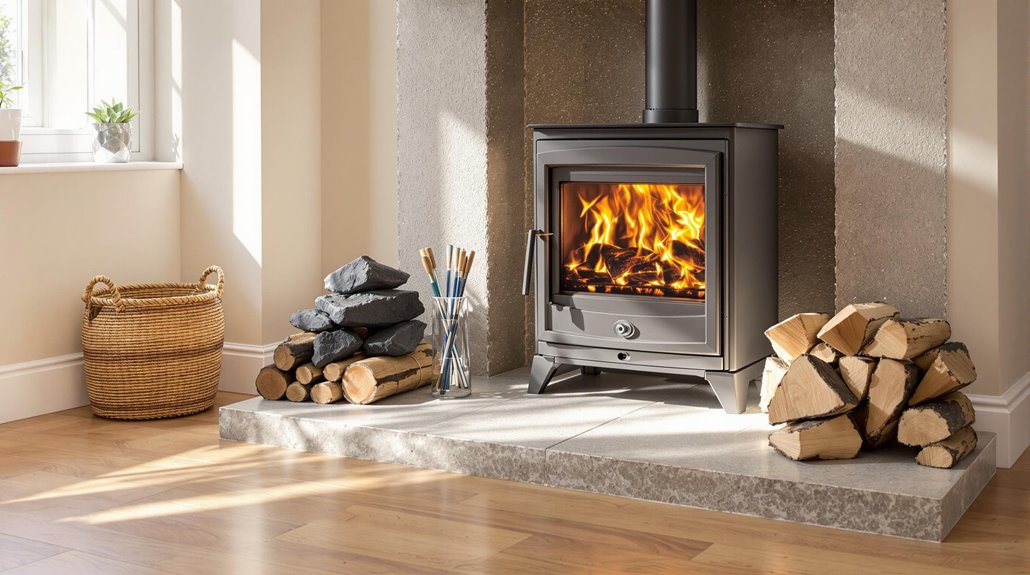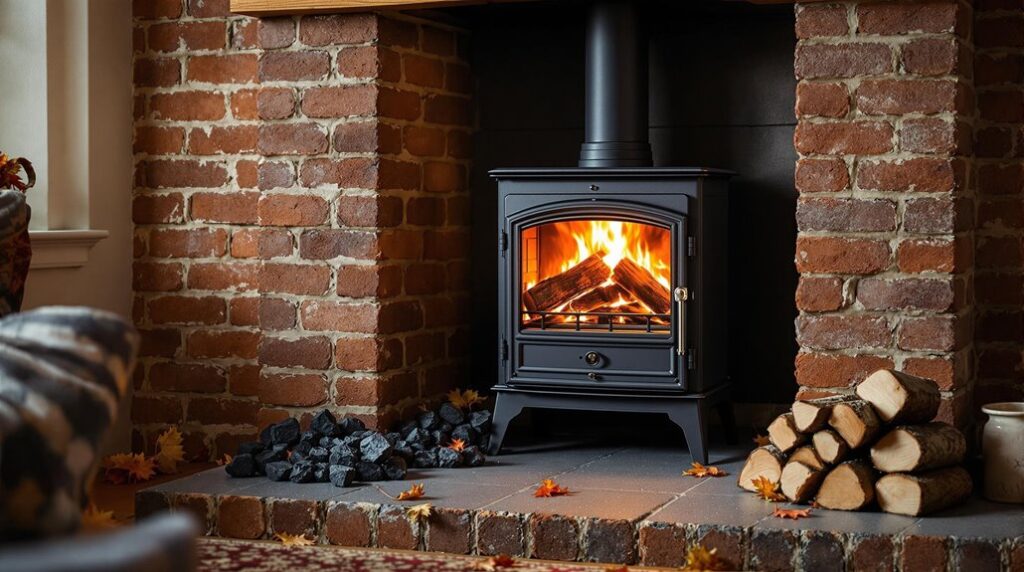I’ve encountered this question countless times from homeowners who assume their log burner can handle any solid fuel. Here’s the straightforward answer: you cannot legally burn house coal in most UK log burners, and doing so could damage your appliance or create dangerous conditions. The regulations are strict, the safety risks are real, and the penalties can be significant. But there’s more to this story that affects every wood burner owner in Britain.
Key Takeaways
- House coal is banned for retail sale in England since May 2023, making it illegal for domestic use.
- Coal burns significantly hotter than wood, potentially damaging log burner components and voiding manufacturer warranties.
- Only DEFRA-approved smokeless fuels with HETAS certification can be legally burned in UK domestic appliances.
- Burning coal increases carbon monoxide poisoning risk and produces harmful emissions that block chimneys.
- Multi-fuel stoves specifically designed for coal are required; standard log burners aren’t compatible with coal.
Legal Restrictions on Coal Use in UK Domestic Burners

Since May 1, 2023, England has banned the retail sale of house coal, marking a significant shift in domestic fuel regulations. I can’t legally purchase traditional house coal anymore – only authorized smokeless fuels are available for domestic burning.
This prohibition directly impacts what I can burn in my log burner. The ban targets reducing harmful emissions from domestic heating, pushing us toward cleaner alternatives. Environmental health officers enforce these regulations, issuing fixed penalty notices starting at £175 for excessive smoke violations.
If you’re caught burning prohibited fuels, repeat offenses can cost up to £300. These regulations stem from the Environment Act 2021, with local authorities handling enforcement. I must check my local council’s specific guidelines, as some areas maintain stricter requirements than national standards. Major cities like London, Birmingham, and Manchester have stringent SCAs that enforce particularly strict air quality controls.
Why House Coal Is Prohibited in Log Burning Stoves
Understanding these legal restrictions leads directly to examining why house coal faces such stringent prohibitions in the first place. I’ve found that house coal creates five times more smoke than smokeless alternatives and produces double the sulphur dioxide emissions. What’s particularly concerning is its contribution to PM2.5 pollution – the most harmful airborne particles that threaten our health.
From a technical standpoint, house coal burns inefficiently in log burners, wasting fuel and increasing your costs. The excessive smoke creates soot buildup that damages your appliance and shortens its lifespan. Meanwhile, smokeless fuels generate higher heat output and burn longer, requiring less frequent refueling. The sale of traditional house coal was banned in England in 2021 as part of stricter environmental regulations.
These prohibitions aren’t arbitrary – they’re protecting us from contributing to the 36,000 premature UK deaths annually linked to coal smoke exposure.
Approved Smokeless Fuels for Multi-Fuel Appliances

Always check your appliance manual for compatible fuels – using wrong types voids warranties. Look for HETAS approval logos when purchasing, and verify fuels appear on DEFRA’s authorised list. These certified options keep you compliant while delivering the warmth you need. Multi-fuel stoves with Defra approval are specifically designed to burn these approved fuels in smoke control areas.
Safety Hazards of Using Coal in Wood-Only Stoves
While coal might seem like an efficient heating option, burning it in wood-only stoves creates deadly risks that can cost you your life. Coal burns considerably hotter than wood, exceeding your stove’s design limits and warping components until they crack or fail completely. This intense heat shatters clay containers and ignites nearby materials more readily than wood embers.
You’re also facing serious carbon monoxide poisoning. Coal produces higher CO levels than wood, and inadequate venting traps this colourless, odourless killer indoors. Symptoms progress from dizziness and nausea to unconsciousness—sometimes fatally. I’ve seen documented cases of children poisoned by indoor coal use.
Your wood stove lacks proper air controls for coal combustion, creating incomplete burning that amplifies toxic emissions and voids your manufacturer’s warranty entirely. The inefficient combustion also generates excess soot and unburned particles that can block chimneys, dramatically increasing your risk of dangerous chimney fires.
Best Alternative Fuels for Compliant Home Heating

Since coal poses such significant dangers in wood-only stoves, you’ll need safer alternatives that won’t compromise your health or violate local regulations. I recommend DEFRA-compliant wood fuels bearing “Ready to Burn” certification, which maintain moisture levels at 20% or below and work perfectly in smoke-controlled areas. Understanding energy efficiency metrics can help you choose the best fuels for your home heating needs.
You’ll find manufactured solid fuels particularly effective – firelogs made from coffee waste or compressed biomass from wheat husks produce higher heat output than traditional logs. Coffee logs burn up to 20% hotter than seasoned logs while reducing landfill emissions by reusing organic waste. Bioethanol stoves offer another excellent solution, delivering 100% efficiency with real flames while generating up to 3kW of heat without requiring chimneys.
For extended burn times, consider sawdust-glycerol composite logs that provide 30% higher heat output. Always verify your stove’s compatibility before switching fuels to prevent damage.
Conclusion
I can’t stress enough that you shouldn’t put house coal in your log burner—it’s illegal and dangerous. You’ll face legal issues and risk damaging your appliance or worse. I recommend sticking to DEFRA-approved smokeless fuels if you’ve got a multi-fuel stove, or quality seasoned wood for wood-only units. Always check your manufacturer’s specifications and look for HETAS certification. Your safety and compliance depend on using the right fuel.
References
- https://energysavingtrust.org.uk/wood-burner-regulations-fines/
- https://uk-air.defra.gov.uk/assets/documents/reports/cat09/1901291307_Ready_to_Burn_Web.pdf
- https://www.gov.uk/smoke-control-area-rules
- https://www.imaginfires.co.uk/blog/log-burner-regulations/
- https://www.homebuilding.co.uk/advice/can-you-burn-coal-in-a-log-burner
- https://www.yorkshireeveningpost.co.uk/business/consumer/log-burner-fine-uk-wood-stove-chimney-rules-defra-approved-fuels-regulations-are-they-safe-4708327
- https://www.love-logs.com/blogs/log-burners/are-log-burners-being-banned-a-simple-guide-to-the-defra-clean-air-strategy-for-anyone-who-owns-a-log-burner-or-open-fireplace
- https://www.gov.uk/government/news/end-to-coal-power-brought-forward-to-october-2024
- https://www.woodsure.co.uk/clean-air-night-fact-sheet/
- https://ncc-flue.co.uk/blog/new-wood-burning-stove-regulations-for-2025/

